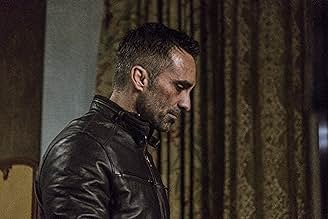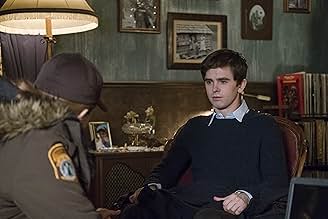The Body
- Episode aired Apr 10, 2017
- TV-MA
- 45m
IMDb RATING
8.7/10
1.6K
YOUR RATING
Mother uses tough love to protect Norman; Sheriff Greene opens a murder investigation; Dylan gets help for his brother.Mother uses tough love to protect Norman; Sheriff Greene opens a murder investigation; Dylan gets help for his brother.Mother uses tough love to protect Norman; Sheriff Greene opens a murder investigation; Dylan gets help for his brother.
Daniel Boileau
- Clerk
- (uncredited)
Jenn Griffin
- Older Woman
- (uncredited)
Derek Schnobb
- Diner Patron
- (uncredited)
Chris Shields
- Deputy Baker
- (uncredited)
8.71.6K
1
2
3
4
5
6
7
8
9
10
Featured reviews
This installment wrestles with the repercussions of Norman Bates' confession to murder, exploring the fragile boundaries of identity
"The Body," the eighth episode of Bates Motel's fifth and final season, directed by Freddie Highmore, marks a significant and intense turning point in the series' conclusion, blending psychological tension, thematic complexity, and emotional confrontation. Crafted by Carlton Cuse, Kerry Ehrin, and Anthony Cipriano, and airing on A&E, this installment wrestles with the repercussions of Norman Bates' (Freddie Highmore) confession to murder, exploring the fragile boundaries of identity, culpability, and familial bonds within an atmosphere rife with dread and uncertainty.
The episode opens amid palpable anxiety as Sheriff Jane Greene (Brooke Smith) urges Norman to discuss his 9-1-1 confession regarding the murder of Sam Loomis (Austin Nichols). Norman's vision of Norma (Vera Farmiga)-evanescent and haunting-signals his disintegrating grip on reality. His rapid blinking, oscillation between lucidity and hallucination, and desperate questioning hint at the internal chaos undergirding the narrative's external pressures. This opening scene, charged with emotional vulnerability and tension, sets the tone for an episode steeped in psychological conflict.
Highmore, doubling as director, demonstrates remarkable control, both visually and performance-wise, crafting a tightly focused and claustrophobic narrative space that mirrors Norman's mental state. His choice to emphasize close, intimate framing allows viewers to inhabit Norman's fractured perspective, amplifying the unfolding anxiety. Noteworthy is his portrayal of Norman's fluctuating demeanor-from compliant and fragile to guarded and subtly menacing, especially in scenes confronting authority figures such as Sheriff Greene and Julia Ramos (Julia Ramos), the newly introduced interrogator hired by Dylan.
The episode's writing and direction create a compelling sense of dread rooted in Norman's loss of freedom-both physical and psychological. For the first time in the series, Norman is stripped of the sanctuary of the Bates Motel, forced into police custody where the constraints threaten to dismantle the fragile balance between his multiple identities. The dichotomy of "Mother" and Norman, central since the series' inception, takes on new life, with Farmiga's spectral Norma commanding scenes with a blend of tough maternal authority and chilling emotional detachment. One striking moment depicts Norma's attempts to manipulate and protect Norman, underpinning the complexity of their symbiotic relationship.
The narrative tension is heightened by the presence of allies and adversaries alike. Dylan (Max Thieriot) moves cautiously, orchestrating legal assistance and confronting impossible dilemmas regarding family loyalty and justice. Concurrently, Sheriff Romero (Nestor Carbonell), despite injuries sustained and the gravity of his vendetta, reenters the Bates world liminally-his emotional torment powerfully portrayed in scenes where he encounters Zimmer's embalmed Norma, and his fatalistic resolve fans the simmering conflict. Carbonell's restrained but expressive performance balances the episode's psychological suspense with somber gravitas.
Supporting performances enrich the episode's layered texture. Brooke Smith's Sheriff Greene exudes a skeptical professionalism that cuts through Norman's fragile facades, delivering sharp dialogue and maintaining narrative momentum. Julia Ramos, portrayed by rising actress Julia Ramos, introduces legal stakes and tension, her interrogation scenes serving as catalysts that pressure Norman into revealing fractured truths and nightmares masked as reality.
Visually, the episode thrives on its use of chiaroscuro-deep shadows against sharp, clinical lighting-to underscore themes of duality, imprisonment, and fractured perception. Scenes within the interrogation rooms exhibit cold sterility, contrasting sharply with the warm, albeit unsettling, glow of hallucinatory sequences featuring Norman and Norma. The editing pace is measured, allowing moments of quiet to linger, making bursts of tension more effective. Carbonell's direction benefits from Highmore's intimate understanding of the character, resulting in a cohesive stylistic vision that melds psychological depth with narrative propulsion.
Thematically, "The Body" probes the nature of truth, culpability, and identity in the crucible of mental illness. Norman's confession blurs lines between reality and delusion, guilt and innocence, illustrating the tragic costs of fractured mindscapes and family secrets. Norma's omnipresence, both a protective and destructive force, embodies the enduring grip of past trauma, thwarting Norman's chance at freedom or redemption. The episode also foreshadows the increasing legal and existential peril Norman faces as the narrative hurtles toward its inevitable climax.
While the episode's focus on psychological tension is generally praised, some critics note a slower pace and the episodic feel of certain legal procedural elements. Despite this, such moments serve to ground the narrative in realism amidst its often surreal psychological exploration. The balance struck between interior character study and exterior plot development sustains narrative urgency while deepening emotional resonance.
"The Body" is a gripping and psychologically intricate episode that exemplifies Bates Motel's unique capacity to merge horror, thriller, and intimate character drama. Freddie Highmore's dual role as actor and director yields a visually compelling and emotionally raw exploration of Norman Bates' fragmentation, while the ensemble cast builds a tense narrative web that reflects the tragic inevitability surrounding the Bates family.
The episode opens amid palpable anxiety as Sheriff Jane Greene (Brooke Smith) urges Norman to discuss his 9-1-1 confession regarding the murder of Sam Loomis (Austin Nichols). Norman's vision of Norma (Vera Farmiga)-evanescent and haunting-signals his disintegrating grip on reality. His rapid blinking, oscillation between lucidity and hallucination, and desperate questioning hint at the internal chaos undergirding the narrative's external pressures. This opening scene, charged with emotional vulnerability and tension, sets the tone for an episode steeped in psychological conflict.
Highmore, doubling as director, demonstrates remarkable control, both visually and performance-wise, crafting a tightly focused and claustrophobic narrative space that mirrors Norman's mental state. His choice to emphasize close, intimate framing allows viewers to inhabit Norman's fractured perspective, amplifying the unfolding anxiety. Noteworthy is his portrayal of Norman's fluctuating demeanor-from compliant and fragile to guarded and subtly menacing, especially in scenes confronting authority figures such as Sheriff Greene and Julia Ramos (Julia Ramos), the newly introduced interrogator hired by Dylan.
The episode's writing and direction create a compelling sense of dread rooted in Norman's loss of freedom-both physical and psychological. For the first time in the series, Norman is stripped of the sanctuary of the Bates Motel, forced into police custody where the constraints threaten to dismantle the fragile balance between his multiple identities. The dichotomy of "Mother" and Norman, central since the series' inception, takes on new life, with Farmiga's spectral Norma commanding scenes with a blend of tough maternal authority and chilling emotional detachment. One striking moment depicts Norma's attempts to manipulate and protect Norman, underpinning the complexity of their symbiotic relationship.
The narrative tension is heightened by the presence of allies and adversaries alike. Dylan (Max Thieriot) moves cautiously, orchestrating legal assistance and confronting impossible dilemmas regarding family loyalty and justice. Concurrently, Sheriff Romero (Nestor Carbonell), despite injuries sustained and the gravity of his vendetta, reenters the Bates world liminally-his emotional torment powerfully portrayed in scenes where he encounters Zimmer's embalmed Norma, and his fatalistic resolve fans the simmering conflict. Carbonell's restrained but expressive performance balances the episode's psychological suspense with somber gravitas.
Supporting performances enrich the episode's layered texture. Brooke Smith's Sheriff Greene exudes a skeptical professionalism that cuts through Norman's fragile facades, delivering sharp dialogue and maintaining narrative momentum. Julia Ramos, portrayed by rising actress Julia Ramos, introduces legal stakes and tension, her interrogation scenes serving as catalysts that pressure Norman into revealing fractured truths and nightmares masked as reality.
Visually, the episode thrives on its use of chiaroscuro-deep shadows against sharp, clinical lighting-to underscore themes of duality, imprisonment, and fractured perception. Scenes within the interrogation rooms exhibit cold sterility, contrasting sharply with the warm, albeit unsettling, glow of hallucinatory sequences featuring Norman and Norma. The editing pace is measured, allowing moments of quiet to linger, making bursts of tension more effective. Carbonell's direction benefits from Highmore's intimate understanding of the character, resulting in a cohesive stylistic vision that melds psychological depth with narrative propulsion.
Thematically, "The Body" probes the nature of truth, culpability, and identity in the crucible of mental illness. Norman's confession blurs lines between reality and delusion, guilt and innocence, illustrating the tragic costs of fractured mindscapes and family secrets. Norma's omnipresence, both a protective and destructive force, embodies the enduring grip of past trauma, thwarting Norman's chance at freedom or redemption. The episode also foreshadows the increasing legal and existential peril Norman faces as the narrative hurtles toward its inevitable climax.
While the episode's focus on psychological tension is generally praised, some critics note a slower pace and the episodic feel of certain legal procedural elements. Despite this, such moments serve to ground the narrative in realism amidst its often surreal psychological exploration. The balance struck between interior character study and exterior plot development sustains narrative urgency while deepening emotional resonance.
"The Body" is a gripping and psychologically intricate episode that exemplifies Bates Motel's unique capacity to merge horror, thriller, and intimate character drama. Freddie Highmore's dual role as actor and director yields a visually compelling and emotionally raw exploration of Norman Bates' fragmentation, while the ensemble cast builds a tense narrative web that reflects the tragic inevitability surrounding the Bates family.
Did you know
- TriviaThis is the directorial debut of Freddie Highmore (Norman).
- Quotes
Chick Hogan: After Norma died, Norman felt lonely. And I felt lonely after my kid and my wife took off, so we became friends. You know, but when I say it like that it sounds like, you know, reductive. It wasn't just a-a-a friendship of necessity. I recognized in Norman that he had the soul of an artist.
- SoundtracksBack Home Again
Written and Performed by John Denver
Details
- Release date
- Country of origin
- Language
- See more company credits at IMDbPro
Contribute to this page
Suggest an edit or add missing content


























